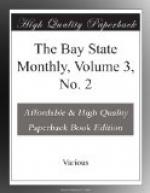Froissart, describing a Christmas festival given by Comte de Foix in the fourteenth century, says:
“There were many Mynstrels as well of hys own as of strangers, and eache of them dyd their devoyres in their facalties. The same day the Earl of Foix gave to Hauralds and Minstrelles the sum of 500 franks, and gave to the Duke of Tonrayns Mynstreles gouns of cloth of gold furred with ermyne valued at 200 franks.”
The courts of kings swarmed with these merry singers in the Dark Ages, and such sums were expended upon them, that they often drained the royal treasuries. In William’s army there was a brave warrior named Taillefer, who was as renowned for minstrelsy as for arms. Like Tyrtaeus and Alemon, in Sparta, he inspired his comrades with courage by his martial strains, and actually led the van in the fight against the English, chanting the praises of Charlemagne, and Roland. Richard Coeur de Lion was a distinguished patron of minstrels as well as “the mirror of chivalry.” He was sought out in his prison in Austria by a faithful harper who made himself known by singing a French song under the window of the castle in which the king was confined. Blondel was the harper’s name. The French song translated reads thus:
“Your beauty, lady fair,
None views without delight;
But still so cold an air
No passion can excite.
Yet still I patient see
While all are shun’d like me.
No nymph my heart can wound
If favor she divide,
And smiles on all around
Unwilling to decide;
I’d rather hatred bear,
Than love with others share.”
Edward I had a harper in his train, in his crusade to the Holy Land, who stood by his side in battle.
That same king in his conquest of Wales is said to have murdered all the bards that fell into his hands lest they should rouse the nation again to arms. Gray’s poem, “The Bard,” was written upon that theme. I will quote a few lines:
“Dear lost companions of my tuneful
art,
Dear as the light that visits
these eyes,
Dear as the ruddy drops that warm my heart,
Ye died amidst your dying
country’s cries—
No more I weep. They do not sleep.
On yonder cliffs a griesly
band,
I see them sit; they linger yet,
Avengers of their native land.”
That the minstrel was a privileged character in England down to the reign of Elizabeth is proved by history, by frequent allusions to them in the current literature of the times, and by the large body of songs, ballads, and metrical romances, still extant which are ascribed to them. They were essential to the complete education of a knight as tutors: for no accomplishment was more valued in the days of chivalry than the playing of the harp and the composition of songs in honor of the fair. Before the origin of printing they acted as publishers of the works of more renowned poets by public recitations of their works. The period of their greatest celebrity was about the middle of the fifteenth century. The minstrel chose his own subject and so long as he discoursed to warriors of heroes and enchanters, and to gay knights of true love and fair ladies, he would not want patient and gratified listeners.




